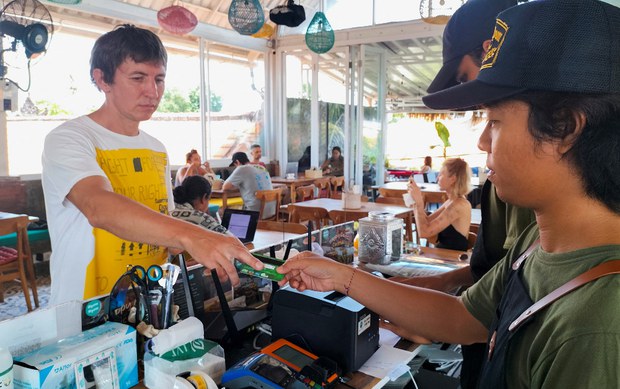Russians in Indonesian tourist paradise feel pinch of West’s sanctions over Ukraine
2022.03.17
Denpasar, Indonesia
 Senator Ruslan (left) uses a credit card from his Russian bank account to pay for lunch while vacationing in Bali, Indonesia, March 9, 2022.
Senator Ruslan (left) uses a credit card from his Russian bank account to pay for lunch while vacationing in Bali, Indonesia, March 9, 2022.
Russian nationals on Bali Island say they are feeling the bite of Western sanctions because they cannot use their Russian credit or bank cards for payments after Visa and Mastercard suspended services in response to the Kremlin’s invasion of Ukraine.
Felix Demin, a Russian businessman who lives on the Indonesian island, said that he and his compatriots have been unable to make online payments with cards issued in their home country.
“I was unable to renew my Apple subscription because my credit was blocked,” Demin told BenarNews, adding that his girlfriend who recently arrived from Russia could not use her credit card.
Visa, Mastercard and American Express have joined a long list of global companies that have suspended operations in Russia in response to President Vladimir Putin’s invasion of Ukraine. Beginning March 10, Visa and Mastercard said any transactions using cards issued in Russia would no longer work abroad.
On Feb. 24, Putin ordered military forces to attack and invade Ukraine in a move he described as a “special military operation” aimed at “demilitarizing” the former Soviet Socialist republic next-door. Since then, many in the international community have accused his government of using false narratives and disinformation to justify the invasion.
Demin said most Russians in Bali oppose the war and have joined Ukrainians in anti-war protests on the island, an Indonesian magnet for foreign tourists.
“It’s a nightmare. Nobody supports the war here,” Demin said, adding that he and many Russians have relatives in Ukraine.
As of March, more than 2,700 Russian nationals and 554 Ukrainians were in Bali, according to immigration authorities.
Anna Pomarina, a Russian businesswoman based in Jakarta, said she was having difficulty receiving payments from Russia.
“I am currently struggling with money because all of my clients are in Russia. They have been unable to transfer money to here and anywhere. This is crazy,” Pomarina told the VOI.id news website.
“My Russian friends here had withdrawn all of their cash from ATMs before March 10 because they knew that after March 10 their accounts would be blocked,” said Pomarina who spent most of the COVID-19 pandemic in Bali.
Following Western actions to freeze accounts, Russia’s central bank said local banks were considering using China’s UnionPay payment system instead. UnionPay, which is state-owned, issues the majority of credit cards in China and operates in 180 countries and regions, including Russia, according to news service reports.
Russian expat: ‘Bali also loves peace’
In Jakarta, Sandiaga Uno, Indonesia’s minister of tourism, said the government was ready to help both Russians and Ukrainians.
“We will help if they need facilitation. The Russian embassy in Indonesia has prepared measures to make things easier for Russian nationals,” he told reporters on Monday.
“Likewise, the Ukrainian embassy [is making efforts] to make things easier for Ukrainians,” he said.
Demin, the expatriate businessman, said Russians in Bali have been opening Indonesian bank accounts.
Russian nationals accounted for the bulk of foreigners in Bali during the coronavirus pandemic, he said, “because they know that life here is easier during the pandemic.”
Travel agencies have reported huge interest among Russians in booking trips to Bali after the war broke out, Demin noted.
“Russians love Bali because they know Bali also loves peace,” he said.

Nearly two years after the Indonesian government imposed a pandemic lockdown, international flights returned to Bali last month and the island reopened to foreign travelers. Earlier this month, the government lifted quarantine rules for Bali after daily COVID-19 cases declined.
Russian businesses account for about 5 percent of foreign investment in Bali in 2021, valued at U.S. $22.4 million (320 billion rupiah) and mainly concentrated in the real estate sector, according to the Investment Coordinating Board.
Trisno Nugroho, the director of the Bali branch of central Bank Indonesia, said sanctions against Russians are unlikely to affect Bali’s tourism.
“Its impact related to tourism is relatively limited, because Australians have started to come in,” Trisno said.
Russians, Ukrainians in Thailand
Meanwhile in another Southeast Asian country whose paradise-like beaches are a major draw for foreign visitors, Thailand’s tourism minister told reporters that about 6,000 to 7,000 Russian and Ukrainian tourists have been stranded in the country.
Officials had discussed measures with the Russian embassy to assist about 3,200 stranded on well-known islands whose beach resorts attract large numbers of foreign visitors, said Chayapol Inthasupha, a local official in Surat Thani province.
“Currently, about 100 to 200 Russian tourists have requested assistance with visa extensions. Yesterday, two tourists made requests for accommodation. No requests have been made yet on money or transfer issues. But we estimate that by the end of this month, their financial problems might begin,” he told BenarNews earlier this week.
“We have prepared accommodations at the International College of Tourism of Rajabhat University, Surat Thani campus at a price of 4,000 baht ($120) per month already.”
Chayapol also said that the Thai International Hospital in Koh Samui would treat tourists who do not have money by allowing them to pay later.
In addition, the Tourism Authority of Thailand said it would waive fines for Russian and Ukrainian tourists who stay in Thailand after their visas expire. Such violations normally carry fines of 500 baht ($15) per day.
Nontarat Phaicharoen contributed to this report from Bangkok.







